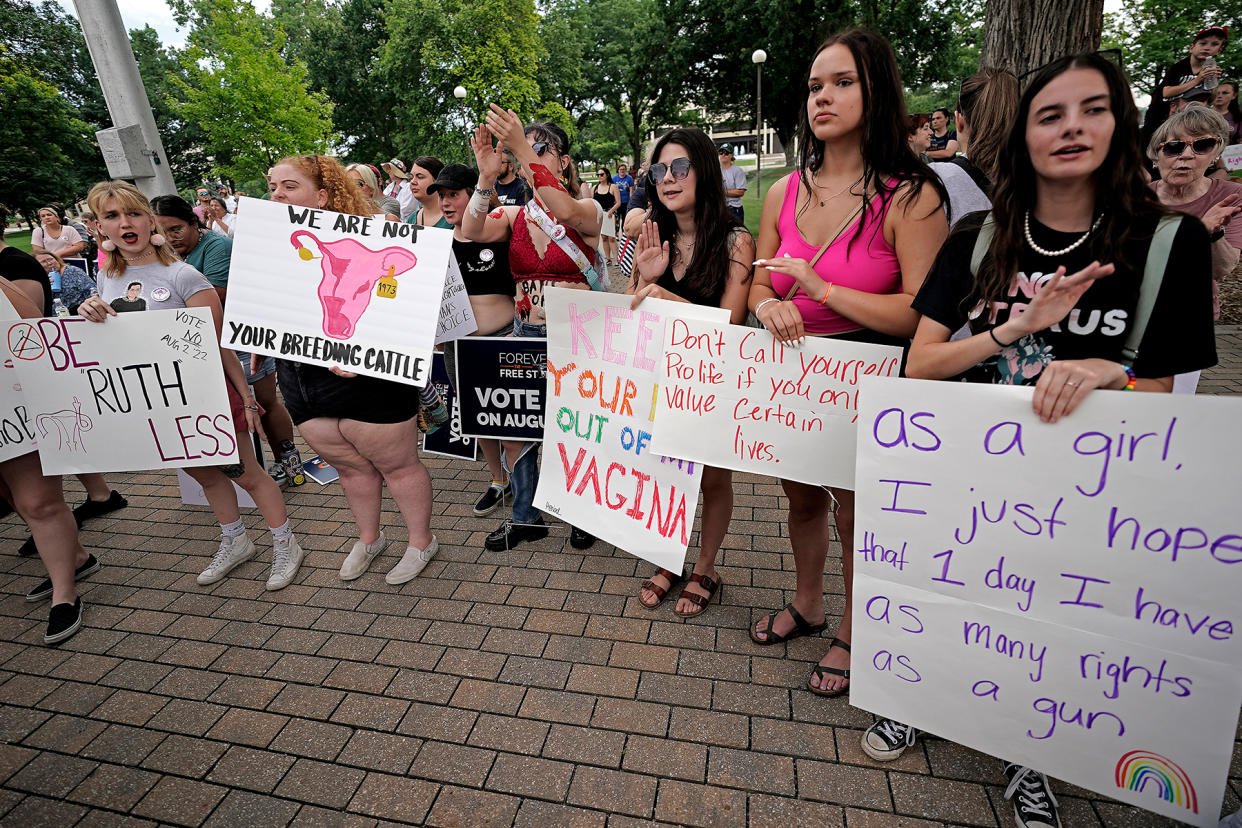Can Kansas Cling to Abortion Rights?

Tomorrow, Kansas will be the first state in the nation to vote on abortion rights in the wake of the reversal of Roe v. Wade. The stakes couldn’t be higher, and the election could be a bellwether for the future of abortion rights nationwide.
On August 2, as part of the state’s primary election, Kansas voters will weigh an amendment to the state constitution that could quickly lead to a complete ban on abortion. The Kansas referendum’s origin story dates back to 2019. That year, the Kansas Supreme Court held that the state constitution protects abortion rights in the state. (The decision did not rely on Roe v. Wade or federal constitutional protection.) Antiabortion activists and legislators have since spearheaded a campaign to amend the Kansas constitution to end this guarantee of reproductive rights. But in Kansas, like in all states except Delaware, the final say over amending the constitution is with the people of the state, who vote on any proposed amendment.
More from Rolling Stone
'It's Just Going to Unravel': One of the Midwest's Last Abortion Doctors Sees Darker Days Ahead
Rep. Glenn Thompson Voted Against Same-Sex Marriage, Then Attended His Gay Son's Wedding
If a majority of Kansans vote yes and choose to amend the state constitution, they will open the door for state legislators to ban almost all abortion. Republicans have already vowed to ban abortions even in cases of rape or incest. (While Kansas has a Democratic Governor, there is a GOP supermajority in the legislature that could overrule her veto.) A no vote, on the other hand, would mean that existing protections under the state constitution would continue to apply to abortion rights — irrespective of the U.S. Supreme Court’s decision in Dobbs.
The weeks since Roe’s reversal have already made clear the dire consequences for people in states where abortion is now banned. Abortion bans do not just impact people wanting to end unintended pregnancies—they have collateral consequences for all pregnant people. The Republican Attorney General in Kansas recently issued an opinion clarifying that miscarriage care and ectopic pregnancy treatment aren’t considered an abortion in Kansas; that’s also true in many of the states that now ban abortion, but treatment for ectopic pregnancies and miscarriages has nevertheless been delayed or denied.
The Kansas referendum promises to be close. By design of the state’s Republican legislature, the referendum is part of a primary election, where turnout is typically lower and the electorate skews more conservative. This favors supporters of the amendment: A recent poll of likely primary voters showed that 47 percent planned to vote yes, 43 percent planned to vote no, and 10 percent were unsure. (By contrast, a 2021 poll showed that 60 percent of adults statewide did not want abortion to be completely illegal and 51 percent agreed with the statement: “the Kansas government should not place any regulations on the circumstances under which women can get abortions.”)
One of the authors of this article, Greer Donley, saw, first hand, the passions stirred by this referendum earlier this month. Donley is a Kansas native and spent three weeks in early July in the state. She observed more engagement for this election than any other in memory. In her Kansas City suburban neighborhood, Vote No signs outnumbered Vote Yes signs 5:1. Support for abortion rights is apparent in early voting numbers: Kansans are showing up for early voting at rates 2.5 times greater than past primary elections, especially in more progressive neighborhoods, and new voter registration jumped 1,000 percent after the Dobbs decision.
This is not the first time Kansas has dominated abortion news. The state has one of the darkest histories of anti-abortion violence in the country, culminating in the 2009 murder of Dr. George Tiller while he was attending church on a Sunday morning. Dr. Tiller’s practice in Wichita had been the focus of Operation Rescue and the most extreme elements of the antiabortion movement for decades. After Dr. Tiller was assassinated, however, Kansas abortion providers did not back down, continuing to provide care for anyone who needed it.
Given the complexities of abortion politics in Kansas, this vote will be seen as the first big test for abortion rights since Dobbs. Both sides know it, and big money is flowing into the state trying to grab a win.
The antiabortion movement arguably has the most to lose. A defeat of the amendment could be a stark blow, showing that the U.S. Supreme Court’s decision is out of step with broader segments of the country and the beliefs of majorities in red states. Another vote on whether to jettison a state constitutional protection for abortion will take place in Kentucky in November, and possibly in Pennsylvania next year. Even a narrow victory for the referendum in Kansas could be seen as a loss given what it might signal for votes in other states.
If Kansans can defeat the amendment, it could also invigorate ballot-based strategies in other states. An initiative protecting abortion rights is expected to appear on the Michigan ballot in November, giving the voters a chance to overturn a pre-Roe law that criminalizes abortion. (That law is currently on hold, pending litigation.) Voters in Vermont and California will also decide this November whether to add a right to reproductive freedom to their state constitutions, even though neither state is at risk of banning abortions.
Referendums are an interesting strategy because they could de-link abortion from party affiliation. Republicans who support abortion rights might still vote for Republican candidates when they think other issues are more important. But when asked to isolate their vote to only this issue, they can make their voice heard without the dilution of political party affiliation. And when they do, we might just see — starting tomorrow in Kansas — how unpopular abortion bans really are.
Best of Rolling Stone

